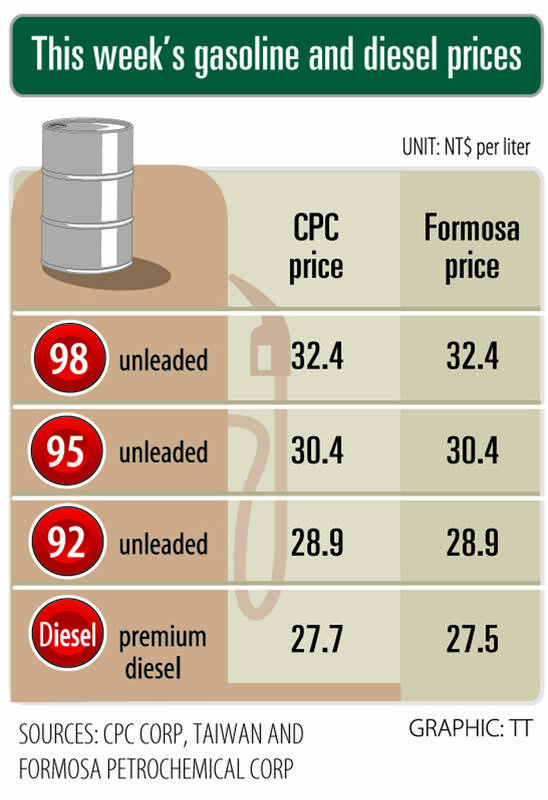CPC Corp, Taiwan (CPC, 台灣中油) and Formosa Petrochemical Corp (台塑石化) yesterday said that gasoline and diesel prices this week would drop by NT$0.1 per liter, effective today.
Following the adjustments, gasoline prices at CPC and Formosa stations are to fall to NT$28.9, NT$30.4 and NT$32.4 per liter for 92, 95 and 98-octane unleaded gasoline respectively, while premium diesel is to cost at NT$27.7 per liter at CPC stations and NT$27.5 at Formosa pumps, the companies said in separate statements.
State-run CPC said its crude oil price last week increased 1.36 percent from a week earlier due to geopolitical tensions in the Middle East.

“Following British and US airstrikes on rebel-held Yemen and Houthi organizations’ missile attacks on a US-owned cargo vessel in the Gulf of Aden, international oil prices rose last week,” CPC said in the statement.
CPC said its gasoline and diesel prices should have increased by NT$1.2 per liter respectively, but the company would absorb part of the cost increases and used a price stabilization mechanism to comply with a government policy of keeping domestic fuel prices lower than in neighboring markets such as Japan, South Korea, Hong Kong and Singapore, it said.
Formosa said global crude oil prices fluctuated within a narrow range last week, after the market dealt with severe cold weather in the US, affecting some crude oil production and the US dollar index rising to a nearly one-month high.
The company decided to match CPC’s price adjustments after accounting for factors such as global oil market trends and fierce domestic market competition, it said.

CHIP RACE: Three years of overbroad export controls drove foreign competitors to pursue their own AI chips, and ‘cost US taxpayers billions of dollars,’ Nvidia said China has figured out the US strategy for allowing it to buy Nvidia Corp’s H200s and is rejecting the artificial intelligence (AI) chip in favor of domestically developed semiconductors, White House AI adviser David Sacks said, citing news reports. US President Donald Trump on Monday said that he would allow shipments of Nvidia’s H200 chips to China, part of an administration effort backed by Sacks to challenge Chinese tech champions such as Huawei Technologies Co (華為) by bringing US competition to their home market. On Friday, Sacks signaled that he was uncertain about whether that approach would work. “They’re rejecting our chips,” Sacks

NATIONAL SECURITY: Intel’s testing of ACM tools despite US government control ‘highlights egregious gaps in US technology protection policies,’ a former official said Chipmaker Intel Corp has tested chipmaking tools this year from a toolmaker with deep roots in China and two overseas units that were targeted by US sanctions, according to two sources with direct knowledge of the matter. Intel, which fended off calls for its CEO’s resignation from US President Donald Trump in August over his alleged ties to China, got the tools from ACM Research Inc, a Fremont, California-based producer of chipmaking equipment. Two of ACM’s units, based in Shanghai and South Korea, were among a number of firms barred last year from receiving US technology over claims they have

BARRIERS: Gudeng’s chairman said it was unlikely that the US could replicate Taiwan’s science parks in Arizona, given its strict immigration policies and cultural differences Gudeng Precision Industrial Co (家登), which supplies wafer pods to the world’s major semiconductor firms, yesterday said it is in no rush to set up production in the US due to high costs. The company supplies its customers through a warehouse in Arizona jointly operated by TSS Holdings Ltd (德鑫控股), a joint holding of Gudeng and 17 Taiwanese firms in the semiconductor supply chain, including specialty plastic compounds producer Nytex Composites Co (耐特) and automated material handling system supplier Symtek Automation Asia Co (迅得). While the company has long been exploring the feasibility of setting up production in the US to address

OPTION: Uber said it could provide higher pay for batch trips, if incentives for batching is not removed entirely, as the latter would force it to pass on the costs to consumers Uber Technologies Inc yesterday warned that proposed restrictions on batching orders and minimum wages could prompt a NT$20 delivery fee increase in Taiwan, as lower efficiency would drive up costs. Uber CEO Dara Khosrowshahi made the remarks yesterday during his visit to Taiwan. He is on a multileg trip to the region, which includes stops in South Korea and Japan. His visit coincided the release last month of the Ministry of Labor’s draft bill on the delivery sector, which aims to safeguard delivery workers’ rights and improve their welfare. The ministry set the minimum pay for local food delivery drivers at